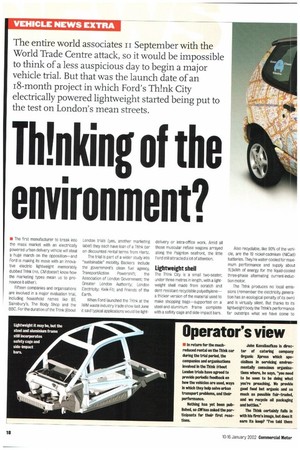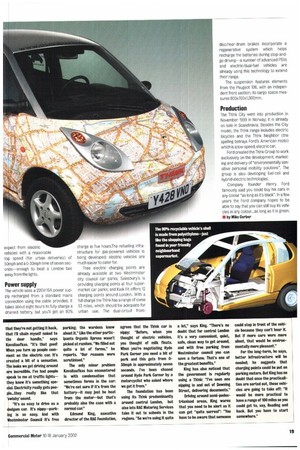IhNking of the environment?
Page 18

Page 19

If you've noticed an error in this article please click here to report it so we can fix it.
• The first manufacturer to break into the mass market with an electrically powered urban delivery vehicle will steal a huge march on the opposition—and Ford is making its move with an innovative electric lightweight memorably dubbed Think (no, CM doesn't know how the marketing types mean us to pronounce it either).
Fifteen companies and organisations are involved in a major evaluation trial, including household names like BT, Sainsbury's, The Body Shop and the BBC. For the duration of the Think @bout London trials (yes, another marketing label) they each have loan of a Think car on discounted rental terms from Hertz.
The trial is part of a wider study into "sustainable" mobility. Backers include the government's clean fuel agency, TransportAction Powershift; the Association of London Government; the Greater London Authority; London Electricity; Kwik-Fit; and Friends of the Earth.
When Ford launched the Think at the IWM waste industry trade show last June it said typical applications would be light
delivery or intra-office work. Amid all those muscular refuse wagons arrayed along the Paignton seafront, the little Ford still attracted a lot of attention.
Lightweight shell
The Think City is a small two-seater, under three metres in length, with alightweight shell made from scratch and dent-resistant recyclable polyethylene— a thicker version of the material used to make shopping bags—supported on a steel-and-aluminium frame complete with a safety cage and side-impact bars.
Also recyclable, like 90% of the vehicle, are the 19 nickel-cadmium (NiCad) batteries. They're water-cooled for maximum performance and supply about 11.5kWh of energy for the liquid-cooled three-phase alternating current-induction motor.
The Think produces no local emissions (remember the electricity generation has an ecological penalty of its own) and is virtually silent. But thanks to its lightweight body the Think's performance far outstrips what we have come to expect from electric vehicles with a reasonable top speed (for urban de(veries) of 50mph and a 0-30mph time of seven seconds—enough to beat a London taxi away from the lights.
Power supply
The vehicle uses a 220V/16A power supply recharged from a standard mains connection using the cable provided. It takes about eight hours to fully charge a drained battery, but you'll get an 80% charge in five hoursThe refuelling infrastructure for gas-powered vehicles is being developed; electric vehicles are much easier to cater for.
Free electric charging points are already available at two Westminster city council car parks; Sainsbury's is providing charging points at four supermarket car parks; and Kwik Fit offers 12 charging points around London. With a full charge the Think has a range of some 53 miles, which should be adequate for urban use. The dual-circuit front disc/rear-drum brakes incorporate a regenerative system which helps recharge the batteries during stop-andgo driving—a number of advanced PSVs and electric/dual-fuel vehicles are already using this technology to extend their range.
The suspension features elements from the Peugeot 106, with an independent front section; its cargo space measures 800x700x1,000mm.
Production
The Th!nk City went into production in November 1999 in Norway; it is already on sale in Scandinavia. Besides the City model, the Th!nk range includes electric bicycles and the Th!nk Neighbor (the spelling betrays Ford's American roots) which is a low-speed, electric car.
Ford created the Th!nk Group to work exclusively on the development, marketing and delivery of "environmentally sensitive personal mobility solutions". The group is also developing fuel-cell and hybrid-electric technologies.
Company founder Henry Ford famously said you could buy his cars in any colour "as long as it's black". In a few years the Ford company hopes to be able to say that you can still buy its vehicles in any colour...as long as it is green.
• by Mike Gerber
















































































































































